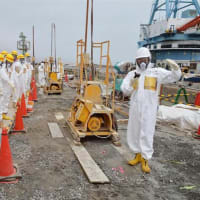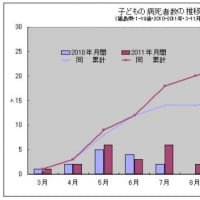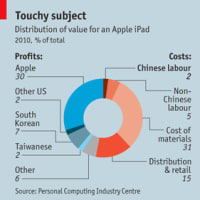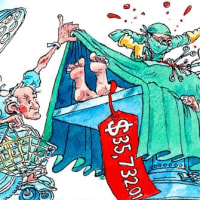今回の経済危機を、日本の問題と重ねて論じている記事は、最近エコノミスにも出ていたりしてました。カバーで、オバマとメルケルが、着物を着てる号があったんですナ。
で、1997年のアジア金融危機や、その他、途上国の経験から学ぶ点もあるんじゃないか、というのが、このブログなんですな。結構面白いし、整理されてるんで転載。
Global financial turmoil part II: Five lessons from developing countries
By Stephen Spratt
The media have reported on the extraordinary events in global markets over the last few weeks with escalating excitement. We are, it seems, sailing from one set of uncharted waters to another, with the water getting choppier all the time. But, for many of us who study financial crises in developing countries, much of this seems rather familiar.
途上国の金融危機を研究するものにとっては、なじみの問題だ。
Here are five lessons from developing countries that policy-makers might want to consider:
以下、5つの教訓。
一つ目。
Sometimes markets are right – markets can be irrational, but this does not mean they are always wrong. The market view that many European countries have unsustainable levels of debt is correct, and it is no good pretending otherwise. The desperate desire to avoid private sector losses at all costs has been a prominent feature of developing country crises, which produces one of two results: outright default (as in Argentina), or years of economic hardship as the burden of adjustment is borne entirely by the citizens of the affected countries (as in too many developing countries). Even the IMF now accepts this - a far cry from the Fund’s previous positions on developing country crises. Governments need to accept this basic fact and impose a reduction of debts to sustainable levels - this means the private sector accepting major losses.
ときには、マーケットは正しい。欧州の多くの国の負債が持続不能なレベルにあるとマーケットがみているのは正しい。で、そうではないのだ、と装うのはよろしくない。どんな犠牲を払っても私的部門のロスを避けようとするのは途上国の特筆すべき特徴となってきているが、それはアルゼンチンのようなデフォルトに終わるか、長い年月をかけた調整負担がつづくことになる。政府は、この事実を受け止めて、負債の削減に取り組まねばならない。そして、その手段としては、私的部門が主要な損失を引き受けるということである。
二つ目。
And sometimes they are wrong – the decision to ban short-selling triggered the usual complaints about ‘shooting the messenger’. This reflects the false view that markets merely respond to changes in economic fundamentals. The self-fulfilling nature of some crises in developing countries have demonstrated that market ‘sentiment’ can be the most important economic fundamental of all, and that this can become decoupled from economic reality. When Malaysia implemented capital controls in 1998 to prevent speculation against its currency, dire consequences were predicted. When the controls were lifted a year later, more money flowed into Malaysia because it had remained relatively stable. Direct controls on market activity to short-circuit destructive speculation in a crisis can be both necessary and effective.
ときには、マーケットは間違える。マーケットの売り規制がよろしくないというのは、マーケットは単に経済ファンダメンタルズを反映するのみだという誤った見方を反映している。マーケットと経済の実態は離れてしまうことがある。マレーシアは98年に投機規制をやったがそれはうまく行き、多くの投資が戻ってきた。こうした危機においてのマーケットへの直接の規制は必要だし効果的だ。
This time it is NOT different – bubbles are bubbles, but they can always be described as the result of something else. In the five years from 2000, house prices in Ireland increased by 25% a year and a large proportion of bank lending was directed to the property sector, much of it borrowed from overseas. Prior to 1997, huge amounts of capital flowed into Thailand, particularly the Bangkok property markets, causing land prices to double as real-estate boomed. Whether a Celtic or an Asian Tiger, it is not possible for property prices to grow at multiples of the growth rate of the economy. But booms are exciting and no politician likes to turn the music off when a party is getting going. For this reason counter-cyclical mechanisms need to be hard-wired into financial systems to counter the formation of bubbles. And this needs to be done now, not when a new bubble is forming when it will already be too late.
今回の危機もバブルはバブルだという点で同じだ。海外から多量の資金が押し寄せて資産価格を押し上げた。こうしたブームは発生し始めてから押さえるのは政治的に難しく、事前にバブル規制に取り組まねばならない。今やっておくべきことだ。
Short-term debt is dangerous – a key lesson of developing country crises is the importance of short-term debt. As the great economist Hyman Minsky pointed out, benign economic conditions will lead to a position of ever-greater financial fragility, as more and more debt becomes short-term. The reason is simple: borrowing short-term is cheaper. As long as you can roll the debt over this is fine, but when creditors start to worry about your ability to repay and turn off the tap, a crisis is the inevitable result. Italy needs to roll over debt equivalent to a quarter of its GDP in the next year and other European countries are in a similar position. Lengthening maturities, and preventing a new wave of short-term borrowing, needs to be a core part of restructuring and reform.
短期の負債は危険だ。短期資金は金利が安いが、貸し手が不安になると資金の継続ができなくなる。長期の安定した資金が必要。
Politics matters – uncertainty and a lack of political unity really spooks markets. For different reasons, both the US and EU seem incapable of taking the necessary economic decisions. In the Eurozone, it appears obvious that only greater fiscal union, where risks are collectively guaranteed through the issuance of Eurobonds, for example, will work. But this is not politically acceptable in some of the stronger economies (particularly Germany) who fear they will have to pick up the tab for their profligate neighbours. There have been numerous attempts in developing countries to protect particular economic and financial arrangements in a crisis. To work, markets need to believe that countries both can and will do what is needed, which explains why in 1997 Hong Kong was able to maintain its exchange rate peg with the dollar when many South East Asian countries could not. Countries need to do what is necessary to make an economic system work, or design a new system that they can make work. Muddling through is not an option.
政治が大切。政治の不安定と不統一はマーケットをおびえさせる。米国も欧州も経済に必要な判断をできないでいる。政治が必要な対応をすると、マーケットが信じることが大事。他のアジア諸国ができないなか、香港ドルだけは米ドルへのペグが維持できていたのはそのため。もたもたしている選択肢はない。
ってな感じです。こういう風にまとまっていると、良いですな。
で、1997年のアジア金融危機や、その他、途上国の経験から学ぶ点もあるんじゃないか、というのが、このブログなんですな。結構面白いし、整理されてるんで転載。
Global financial turmoil part II: Five lessons from developing countries
By Stephen Spratt
The media have reported on the extraordinary events in global markets over the last few weeks with escalating excitement. We are, it seems, sailing from one set of uncharted waters to another, with the water getting choppier all the time. But, for many of us who study financial crises in developing countries, much of this seems rather familiar.
途上国の金融危機を研究するものにとっては、なじみの問題だ。
Here are five lessons from developing countries that policy-makers might want to consider:
以下、5つの教訓。
一つ目。
Sometimes markets are right – markets can be irrational, but this does not mean they are always wrong. The market view that many European countries have unsustainable levels of debt is correct, and it is no good pretending otherwise. The desperate desire to avoid private sector losses at all costs has been a prominent feature of developing country crises, which produces one of two results: outright default (as in Argentina), or years of economic hardship as the burden of adjustment is borne entirely by the citizens of the affected countries (as in too many developing countries). Even the IMF now accepts this - a far cry from the Fund’s previous positions on developing country crises. Governments need to accept this basic fact and impose a reduction of debts to sustainable levels - this means the private sector accepting major losses.
ときには、マーケットは正しい。欧州の多くの国の負債が持続不能なレベルにあるとマーケットがみているのは正しい。で、そうではないのだ、と装うのはよろしくない。どんな犠牲を払っても私的部門のロスを避けようとするのは途上国の特筆すべき特徴となってきているが、それはアルゼンチンのようなデフォルトに終わるか、長い年月をかけた調整負担がつづくことになる。政府は、この事実を受け止めて、負債の削減に取り組まねばならない。そして、その手段としては、私的部門が主要な損失を引き受けるということである。
二つ目。
And sometimes they are wrong – the decision to ban short-selling triggered the usual complaints about ‘shooting the messenger’. This reflects the false view that markets merely respond to changes in economic fundamentals. The self-fulfilling nature of some crises in developing countries have demonstrated that market ‘sentiment’ can be the most important economic fundamental of all, and that this can become decoupled from economic reality. When Malaysia implemented capital controls in 1998 to prevent speculation against its currency, dire consequences were predicted. When the controls were lifted a year later, more money flowed into Malaysia because it had remained relatively stable. Direct controls on market activity to short-circuit destructive speculation in a crisis can be both necessary and effective.
ときには、マーケットは間違える。マーケットの売り規制がよろしくないというのは、マーケットは単に経済ファンダメンタルズを反映するのみだという誤った見方を反映している。マーケットと経済の実態は離れてしまうことがある。マレーシアは98年に投機規制をやったがそれはうまく行き、多くの投資が戻ってきた。こうした危機においてのマーケットへの直接の規制は必要だし効果的だ。
This time it is NOT different – bubbles are bubbles, but they can always be described as the result of something else. In the five years from 2000, house prices in Ireland increased by 25% a year and a large proportion of bank lending was directed to the property sector, much of it borrowed from overseas. Prior to 1997, huge amounts of capital flowed into Thailand, particularly the Bangkok property markets, causing land prices to double as real-estate boomed. Whether a Celtic or an Asian Tiger, it is not possible for property prices to grow at multiples of the growth rate of the economy. But booms are exciting and no politician likes to turn the music off when a party is getting going. For this reason counter-cyclical mechanisms need to be hard-wired into financial systems to counter the formation of bubbles. And this needs to be done now, not when a new bubble is forming when it will already be too late.
今回の危機もバブルはバブルだという点で同じだ。海外から多量の資金が押し寄せて資産価格を押し上げた。こうしたブームは発生し始めてから押さえるのは政治的に難しく、事前にバブル規制に取り組まねばならない。今やっておくべきことだ。
Short-term debt is dangerous – a key lesson of developing country crises is the importance of short-term debt. As the great economist Hyman Minsky pointed out, benign economic conditions will lead to a position of ever-greater financial fragility, as more and more debt becomes short-term. The reason is simple: borrowing short-term is cheaper. As long as you can roll the debt over this is fine, but when creditors start to worry about your ability to repay and turn off the tap, a crisis is the inevitable result. Italy needs to roll over debt equivalent to a quarter of its GDP in the next year and other European countries are in a similar position. Lengthening maturities, and preventing a new wave of short-term borrowing, needs to be a core part of restructuring and reform.
短期の負債は危険だ。短期資金は金利が安いが、貸し手が不安になると資金の継続ができなくなる。長期の安定した資金が必要。
Politics matters – uncertainty and a lack of political unity really spooks markets. For different reasons, both the US and EU seem incapable of taking the necessary economic decisions. In the Eurozone, it appears obvious that only greater fiscal union, where risks are collectively guaranteed through the issuance of Eurobonds, for example, will work. But this is not politically acceptable in some of the stronger economies (particularly Germany) who fear they will have to pick up the tab for their profligate neighbours. There have been numerous attempts in developing countries to protect particular economic and financial arrangements in a crisis. To work, markets need to believe that countries both can and will do what is needed, which explains why in 1997 Hong Kong was able to maintain its exchange rate peg with the dollar when many South East Asian countries could not. Countries need to do what is necessary to make an economic system work, or design a new system that they can make work. Muddling through is not an option.
政治が大切。政治の不安定と不統一はマーケットをおびえさせる。米国も欧州も経済に必要な判断をできないでいる。政治が必要な対応をすると、マーケットが信じることが大事。他のアジア諸国ができないなか、香港ドルだけは米ドルへのペグが維持できていたのはそのため。もたもたしている選択肢はない。
ってな感じです。こういう風にまとまっていると、良いですな。




















※コメント投稿者のブログIDはブログ作成者のみに通知されます